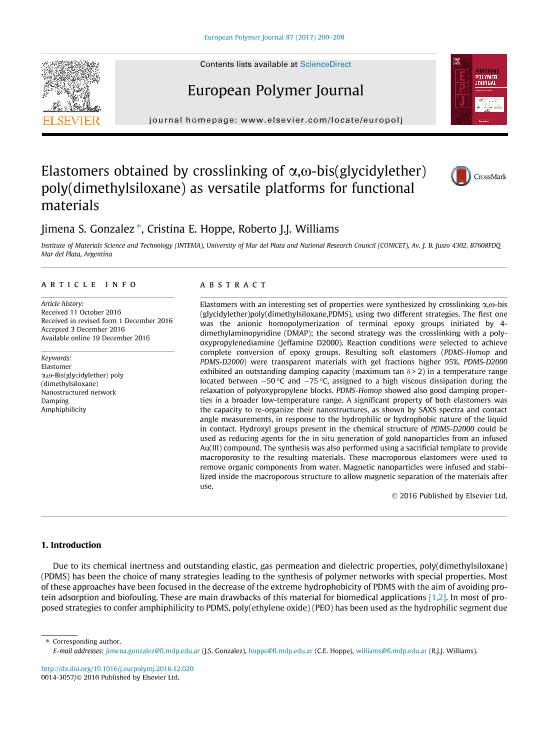Mostrar el registro sencillo del ítem
dc.contributor.author
Gonzalez, Jimena Soledad

dc.contributor.author
Hoppe, Cristina Elena

dc.contributor.author
Williams, Roberto Juan Jose

dc.date.available
2017-07-21T15:30:01Z
dc.date.issued
2016-12-19
dc.identifier.citation
Gonzalez, Jimena Soledad; Hoppe, Cristina Elena; Williams, Roberto Juan Jose; Elastomers obtained by crosslinking of α,ω-bis(glycidylether) poly(dimethylsiloxane) as versatile platforms for functional materials; Elsevier; European Polymer Journal; 87; 19-12-2016; 200-208
dc.identifier.issn
0014-3057
dc.identifier.uri
http://hdl.handle.net/11336/21067
dc.description.abstract
Elastomers with an interesting set of properties were synthesized by crosslinking α,ω-bis(glycidylether)poly(dimethylsiloxane,PDMS), using two different strategies. The first one was the anionic homopolymerization of terminal epoxy groups initiated by 4-dimethylaminopyridine (DMAP); the second strategy was the crosslinking with a polyoxypropylenediamine (Jeffamine D2000). Reaction conditions were selected to achieve complete conversion of epoxy groups. Resulting soft elastomers (PDMS-Homop and PDMS-D2000) were transparent materials with gel fractions higher 95%. PDMS-D2000 exhibited an outstanding damping capacity (maximum tan δ > 2) in a temperature range located between −50 °C and −75 °C, assigned to a high viscous dissipation during the relaxation of polyoxypropylene blocks. PDMS-Homop showed also good damping properties in a broader low-temperature range. A significant property of both elastomers was the capacity to re-organize their nanostructures, as shown by SAXS spectra and contact angle measurements, in response to the hydrophilic or hydrophobic nature of the liquid in contact. Hydroxyl groups present in the chemical structure of PDMS-D2000 could be used as reducing agents for the in situ generation of gold nanoparticles from an infused Au(III) compound. The synthesis was also performed using a sacrificial template to provide macroporosity to the resulting materials. These macroporous elastomers were used to remove organic components from water. Magnetic nanoparticles were infused and stabilized inside the macroporous structure to allow magnetic separation of the materials after use.
dc.format
application/pdf
dc.language.iso
eng
dc.publisher
Elsevier

dc.rights
info:eu-repo/semantics/openAccess
dc.rights.uri
https://creativecommons.org/licenses/by-nc-nd/2.5/ar/
dc.subject
AMPHIPHILICITY
dc.subject
DAMPING
dc.subject
ELASTOMER
dc.subject
NANOSTRUCTURED NETWORK
dc.subject
Α,Ω-BIS(GLYCIDYLETHER) POLY(DIMETHYLSILOXANE)
dc.subject.classification
Nano-materiales

dc.subject.classification
Nanotecnología

dc.subject.classification
INGENIERÍAS Y TECNOLOGÍAS

dc.title
Elastomers obtained by crosslinking of α,ω-bis(glycidylether) poly(dimethylsiloxane) as versatile platforms for functional materials
dc.type
info:eu-repo/semantics/article
dc.type
info:ar-repo/semantics/artículo
dc.type
info:eu-repo/semantics/publishedVersion
dc.date.updated
2017-07-13T19:16:18Z
dc.journal.volume
87
dc.journal.pagination
200-208
dc.journal.pais
Países Bajos

dc.journal.ciudad
Amsterdam
dc.description.fil
Fil: Gonzalez, Jimena Soledad. Consejo Nacional de Investigaciones Científicas y Técnicas. Centro Científico Tecnológico Conicet - Mar del Plata. Instituto de Investigaciones en Ciencia y Tecnología de Materiales. Universidad Nacional de Mar del Plata. Facultad de Ingeniería. Instituto de Investigaciones en Ciencia y Tecnología de Materiales; Argentina
dc.description.fil
Fil: Hoppe, Cristina Elena. Consejo Nacional de Investigaciones Científicas y Técnicas. Centro Científico Tecnológico Conicet - Mar del Plata. Instituto de Investigaciones en Ciencia y Tecnología de Materiales. Universidad Nacional de Mar del Plata. Facultad de Ingeniería. Instituto de Investigaciones en Ciencia y Tecnología de Materiales; Argentina
dc.description.fil
Fil: Williams, Roberto Juan Jose. Consejo Nacional de Investigaciones Científicas y Técnicas. Centro Científico Tecnológico Conicet - Mar del Plata. Instituto de Investigaciones en Ciencia y Tecnología de Materiales. Universidad Nacional de Mar del Plata. Facultad de Ingeniería. Instituto de Investigaciones en Ciencia y Tecnología de Materiales; Argentina
dc.journal.title
European Polymer Journal

dc.relation.alternativeid
info:eu-repo/semantics/altIdentifier/doi/http://dx.doi.org/10.1016/j.eurpolymj.2016.12.020
dc.relation.alternativeid
info:eu-repo/semantics/altIdentifier/url/http://www.sciencedirect.com/science/article/pii/S0014305716312794
Archivos asociados
